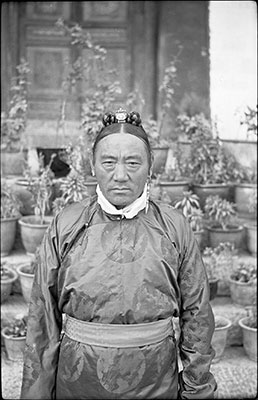
1998.131.478.1 (Film negative)


1998.131.478.1 (Film negative)

Frederick Spencer Chapman
Frederick Spencer Chapman
February 13th 1937
Lhasa > Tsarong House
1998.131.478.1
91 x 61 mm
Negative film nitrate
Donated 1994
Mrs Faith Spencer Chapman
British Diplomatic Mission to Lhasa 1936-37
Frederick Spencer Chapman
A.20 [view film roll]
SC.T.2.478
In Negative - 'A-20' has been scratched into the bottom right hand corner of the negative [MS 28/03/2006]
Manual Catalogues - Caption in Chapman's hand-written list of negatives made whilst on the Mission to Lhasa, 1936-7 [See PRM Manuscripts Collection]: '1/2 Ditto [Tsarong in front of his [steps?]] head & s.' [MS 28/03/2006]
Other Information - Related Images: Images prefixed with 'A' comprise a group of negatives containing images of officials and the Regent riding in ceremonial dress up to the Potala, all apparently taken on February 13th 1937. On this day Tsarong took Chapman unofficially to the Potala so that he could take photographs of the New Year ceremonies (no other Mission members accompanied because an official invitation had not been extended to them). This photograph, therefore, was probably taken at the end of the day, when Tsarong returned home with Chapman [MS 28/03/2006]
Biographical Information - Dasang Damdul Tsarong was a favourite of the 13th Dalai Lama, a military man and later a shappe (cabinet minister in the Tibetan government) until he was removed from office as a result of his modernising policies. He was a great friend of the British Mission frequently inviting them to his house and accompanying them on their various visits around Lhasa. He was considered by the mission to be a great character, as Gould recalled “Once, after a long and festive party at the De Kyi Lingka, he fell asleep in my arms murmuring, “Great minister, I love you, I love you”. At breakfast next morning he had his usual bright eye and was quite unperturbed. He spoke a little English. To him it seemed strange that anybody in India should not welcome British rule”. (1957:236) He had four wives (Including Rigzin Choden, Pema Dolkar, Rinchen Dolma (later Mary Taring) and Tseten Dolkar) and ten children. Although he was in India in 1956 he insisted on going back to Tibet to help the Dalai Lama to escape into exile. He was captured by the Chinese and in 1959 died mysteriously the night before what was due to be his public humiliation.
Research publication - Clare Harris and Tsering Shakya (eds) 'Seeing Lhasa: British Depictions of the Tibetan capital 1936-1947' (Chicago: Serindia Publications), 2003, p. 8.
Other Information - Description: "The door [of Tsarong's house] is ornamented in the best Tibetan style, but in front of it are a dozen granite steps covered with pots of flowering plants" ['Lhasa: The Holy City', F. Spencer Chapman, London: Chatto & Windus, 1938, p. 104] [MS 28/03/2006]
For Citation use:
The Tibet Album.
"Tsarong in front of his house"
05 Dec. 2006. The Pitt Rivers Museum.
<http://tibet.prm.ox.ac.uk/photo_1998.131.478.1.html>.
For more information about photographic usage or to order prints, please visit the The Pitt Rivers Museum.
© The Pitt Rivers Museum